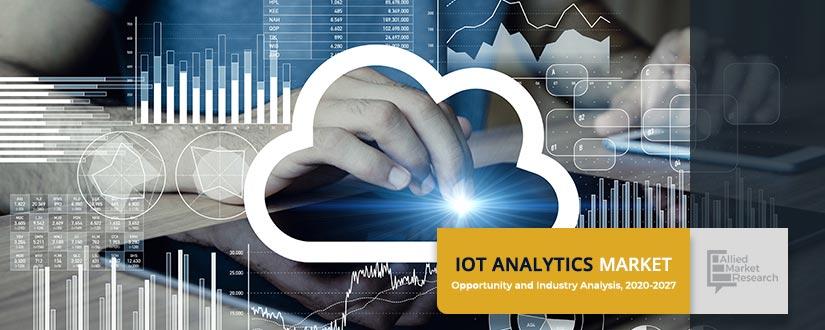IoT Analytics Market Insights
IoT analytics is the practical application of data analytical tools and procedures to realize value from enormous volumes of data produced by connected IoT devices. IoT makes it possible for businesses to collect and analyze data from sensors on manufacturing equipment, weather stations, smart meters, delivery trucks, and other types of machinery. IoT analytics provides similar benefits for management of data centers and other facilities as well as healthcare and retail applications. Rise in adoption of smartwatches, smart speakers, smart TVs, toys, and appliances among users produce a large amount of data periodically for analysis, which increases requirement of IoT analytics. The analytics enables users to improve operations in facilities and enhance decision making.
Impact of COVID-19 on IoT Analytics Market (Pre and Post Analysis):
- Organizations are encouraged to sensitize their employees around information security outside office space. Working from public spaces should be restricted and organization must utilize technologies that ensure confidential information remains secure on these devices in case of theft or damage.
- Organizations should take proactive steps by advising their staff and customers to be more vigilant and cautious especially while opening links, emails, or documents related to the subject COVID-19. Organizations should ensure their detection and alerting capabilities are functional while keeping an eye on impact of having many remote workers.
- Presently, many employees are working from home and students are learning virtually, hence enterprise virtual private network (VPN) servers have now become a lifeline for companies/schools and their security and availability would be a major focus going forward. There is a possibility that an organization’s unpreparedness can lead to security misconfiguration in VPNs. This, in turn, could expose sensitive information on the internet and devices to Denial of Service (DoS) attacks. In addition, some users utilize personal computers to perform official duties, which could also pose a great amount of risk to organizations.
What are the top impacting factors of IoT analytics market growth?
Incredible growth of IoT data, owing to increase in deployment of IoT devices and demand for advanced analytics and automation for businesses to remain competitive are the key factors that drive growth of the IoT analytics market. However, lack of real time algorithms hamper growth of the market. Contrarily, emergence of edge analytics and technology development in PaaS are opportunistic factors for the global market.
Rise in demand for predictive analytics by businesses
Predictive analytics has increased significance, owing to the rise in number of IoT devices. It is a fundamental part of smart decision making, independent of human users. For instance, a self-driven truck uses Global Positioning System (GPS) reach a destination on time through shortest possible route. The GPS makes use of predictive analytics algorithm for controlling the truck and to choose the shortest path.
Through utilization of statistical algorithms, historical data and M2M learning, predictive analytics identifies future results. Predictive analytics use similar IoT data as utilized by IoT devices and processes to generate predictions and inferences. IoT analytics has the ability to process IoT data and create real-time dashboards plotted on various parameters. These solutions help users in taking necessary business decisions by evaluating current data as well as historical data to forecast future results. Hence, owing to these, the demand for predictive analytics by companies is going to be a huge driving factor for the IoT analytics market.
Lack of real-time algorithms
Major factor that restricts rapid development of the IoT analytics market is lack of efficient real-time algorithms. Real-time algorithms are defined with a plan to serve real-time applications and handle data without any delay. IoT analytics being a new domain does not acquire robust algorithms and platforms required to handle growing size of IoT data.
The difference between data generation and data analysis is extremely huge. Owing to this, life span of new algorithms and platforms is restricted, and they get outdated rapidly triggering failure of systems to handle vast data generated through IoT devices. This makes a significant concern for many companies as it eventually results in loss of revenue for them. This is an intense issue, which would gradually diminish with technological innovations in the next few years.
Key benefits of the report:
- This study presents analytical depiction of the global IoT analytics industry along with the current trends and future estimations to determine the imminent investment pockets.
- The report presents information related to key drivers, restraints, and opportunities along with detailed analysis of the IoT analytics market share.
- The current market is quantitatively analyzed to highlight the global IoT analytics market growth scenario.
- Porter’s five forces analysis illustrates the potency of buyers & suppliers in the market.
- The report provides a detailed market analysis based on the present and future competitive intensity of the market.
IoT Analytics Market Report Highlights
| Aspects | Details |
| By Component |
|
| By Deployment Model |
|
| By Application |
|
| By Industry Vertical |
|
| By Region |
|
| Key Market Players | SAP SE., Amazon Web Services Inc., IBM corporation, Dell Technologies Inc., Microsoft Corporation, Oracle Corporation, HP Enterprise Company, Hitachi Ltd, Cisco Systems Inc., Teradata Corporation |
Loading Table Of Content...




